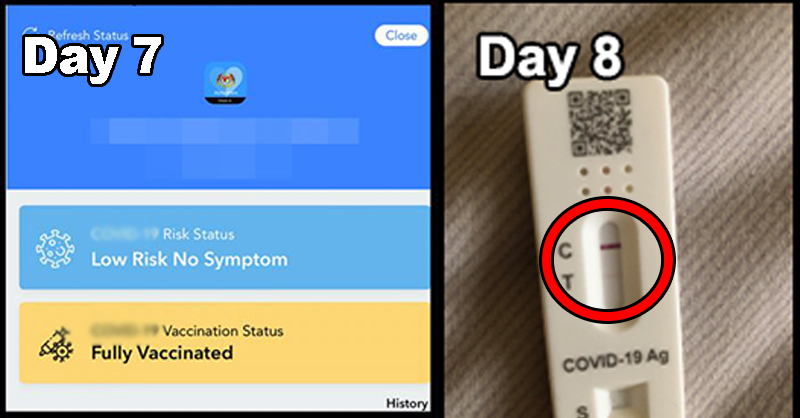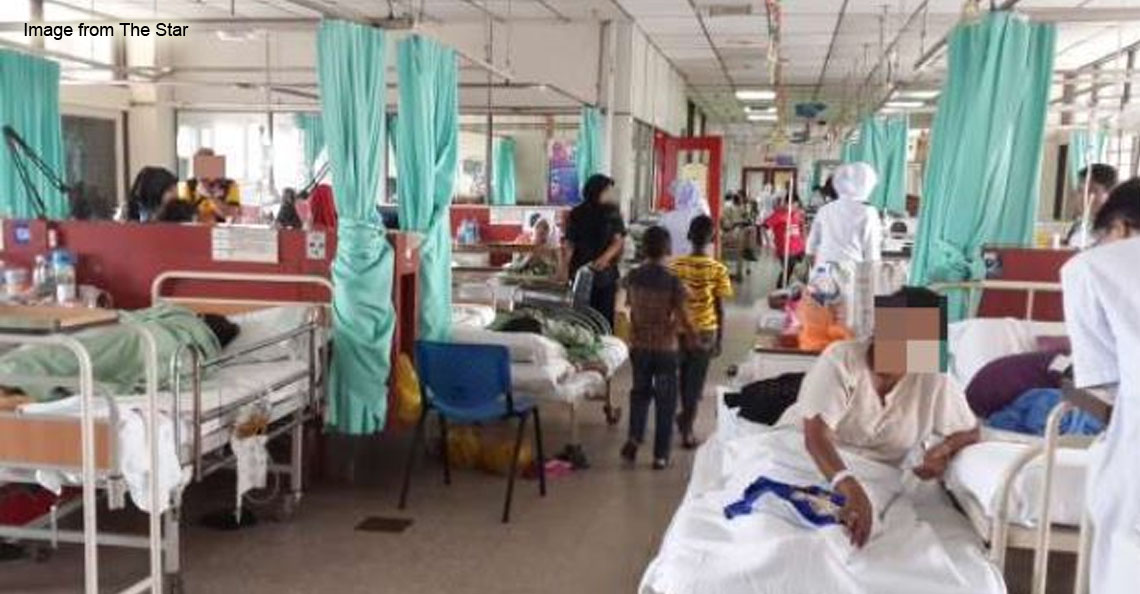We got a c0v1d positive person to try 10 RTK self test kits… here’s how many failed.
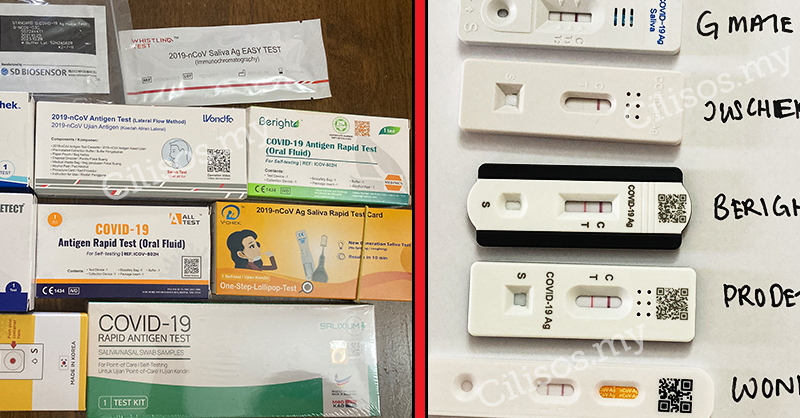
- 8.9KShares
- Facebook4.4K
- Twitter219
- LinkedIn232
- Email344
- WhatsApp3.7K
Compared to the PCR nasal swabs, rapid self test kits (RTK) are faster, cheaper, and less invasive – leading us to salivate more voluntarily than a candidate in a Pavlov experiment. However, you might also have seen posts from people who tested negative on RTK tests, only to find out that they were actually positive after a PCR.
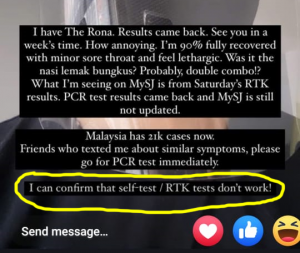
An increase in these incidents, especially with the new variant, have brought the reliability of RTK tests into question, with our health minister recently instructing the Medical Device Authority (MDA), the agency in charge of approvals of self test kits, to call up suppliers to get quality assurance information from manufacturers.
But with so many brands at even more price points, we were curious as to how well effective they were so we did the most obvious thing: We sent a bunch of RTKs to a reader who was con9firm positive and asked her to spit into each one of them.
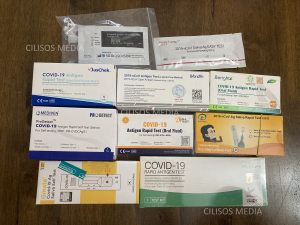
We sent Olivia (fake name by request) 10 RTK brands that we bought from various pharmacies and had her use them in one sitting, and following the instructions on each kit. Just to be on the safe side, we also sent her 2 units of each brand because….science. We know you’re itching to see the results, so we’ll leave the explanations and stuff for the end of the article so yea – here are the results
Nasal swab kits
It’s a mixed bag when it comes to nasal swab RTKs – some studies claim that the saliva test should be to go-to, others say there are no significant differences between the two. We sent Olivia Salixium, a saliva/nasal swab hybrid kit and SD Biosensor, an exclusively nasal swab kit.
Salixium
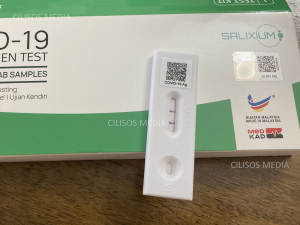
Olivia actually found out she was positive with this kit 5 days before we ran our experiment when she first felt the dreaded symptoms. While she got the same result with our kit, she noted the the lines were a little more faint on our kit, which could have been caused by a lower viral load or simply just a manufacturing difference.
SD Biosensor Standard Q
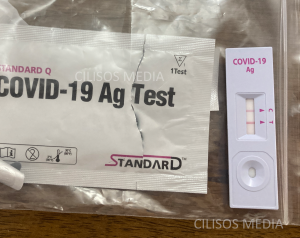
At RM17, this Korean kit is a tad more expensive than your usual brands, and they’re really not that easy to find. But still, the results came back Oppa.
Saliva spit test kits
These are the RTKs you can get hold of fairly easily; most of them are available at pharmacies near you. Just based on anecdotal evidence, these types of kits are probably the ones that people use the most.
Gmate
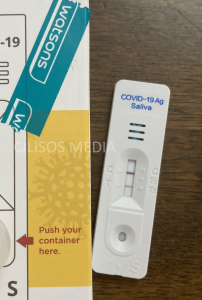
Another kit that’s made in Korea. Like the SD Biosensor, it’s more expensive than other RTKs (they go for about RM17.50 a pop) but unlike SD Biosensor, it’s widely available in local pharmacies.
JusChek (Passed but have to look very closely)
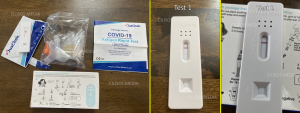
Aaaaand this is the reason why we sent 2 kits. In the first test, the T line (indicating you’re C-19 positive) was super faint, and Olivia would have missed it if it wasn’t for the fact that this experiment required her to spot positives. The documentation that came with the kit did specify that however faint the T line is, it still indicates a positive result, but you might have to look really closely to notice the line.
It wasn’t any better in the second test, when the C line (indicating the test was valid) didn’t appear at all. It only showed up after 10 minutes, longer than the time stated in the instructions.
BeRight
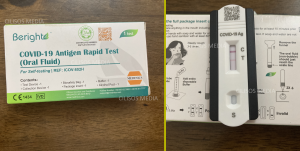
The manufacturers also packaged the kit with an alcohol pad without saying what it’s for in the instructions.
ProDetect
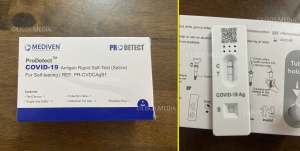
Both the C and T lines appeared in under 5 minutes with the T line being fainter at first, then becoming clearer after.
Wondfo
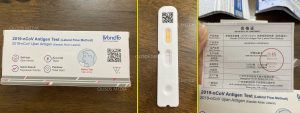
Interestingly, the kit came with a “Certificate of Conformity”.
Alltest
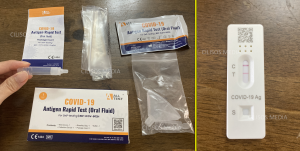
Based on our RTK buying spree, this is the most widely-available kit. And (on our samples at least) it works.
“Lollipop” tests
No nose swabbing, spitting or whistling is required with these kits. They’re marketed as easy-to-use and convenient kits, especially for kids and older folk. How do they work? It differs from kit to kit, but the one thing they have in common is sticking the absorber end into your mouth so it can collect your saliva.
Whistling Test™ (Failed)
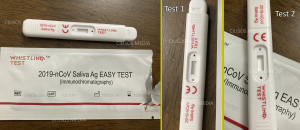
Even after doing the test twice, the kits didn’t seem to absorb enough of Olivia’s oral fluids; to the point where no lines appeared AT ALL. We double-checked with Olivia to make sure she didn’t hold the unit downwards while collecting the saliva (as some other kits do) but no… she read the instructions and followed them to the letter.
V-Chek (Failed)
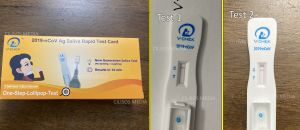
Just like the Whistling one, this other lollipop-style test didn’t work. At least the C line appeared for this one… albeit very, very slowly.
8 outta 10 ain’t bad… since no test is 100% reliable
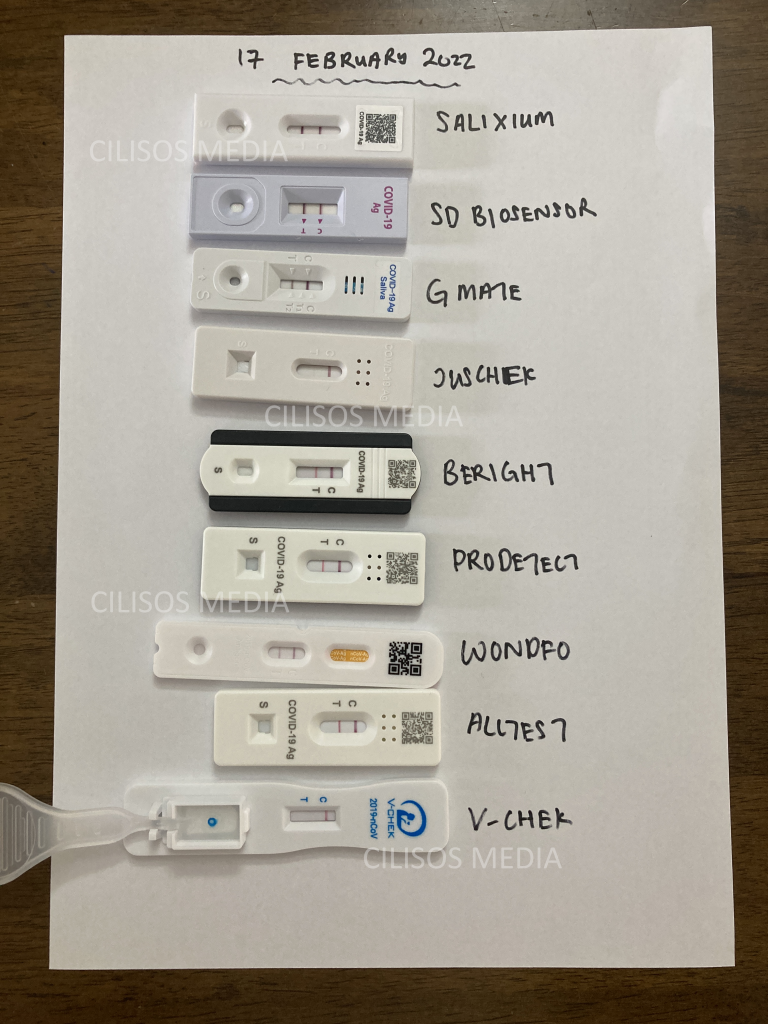
One piece of information we didn’t include is the reliability rate, or sometimes broken down as sensitivity (the ability to detect an infection) and specificity (the ability to rule out an infection). The way these numbers are reported differs according to manufacturer, and you’ll have to read the accompanying brochures for that. Either way though, buying a brand that’s been approved by the MDA means that you can be certain that they hit the minimum requirements.
Why we didn’t think that information was worth including is because, while most RTK manufacturers list their products’ ability to detect the virus at rates above 90%, real-world testing done by researchers puts the number closer to 70% due to various factors such as the viral load and the ability to detect mutating strains. This is why you’re still urged to take a PCR test to be entirely sure. So no, the results of our experiment isn’t a buyers’ guide to RTKs – your own results may vary.
And perhaps most importantly, the results can likely also be influenced by how we take these tests. Some general best practices include:
- Best testing time is when you first wake up, when your mouth has the highest viral load
- Don’t eat, smoke, drink, brush your teeth, etc before taking the test. Otherwise, wait 30 mins or longer
- Reading product brochure a read to follow the instructions. Different test kits have different steps
- Double-check that the kit you’re buying has been approved by the MDA. See here for list.
Overall, it’s a pretty good idea to at least recognize that a single line on your RTK isn’t always a golden ticket to attend a gathering if you’re exhibiting symptoms.
We’d like to give a big shoutout to Olivia for helping us out with this. May your saliva glands have a good rest. We’re planning a sequel for this article so if you’re curious whether a brand of test kit works or not, send it in to us!
- 8.9KShares
- Facebook4.4K
- Twitter219
- LinkedIn232
- Email344
- WhatsApp3.7K


